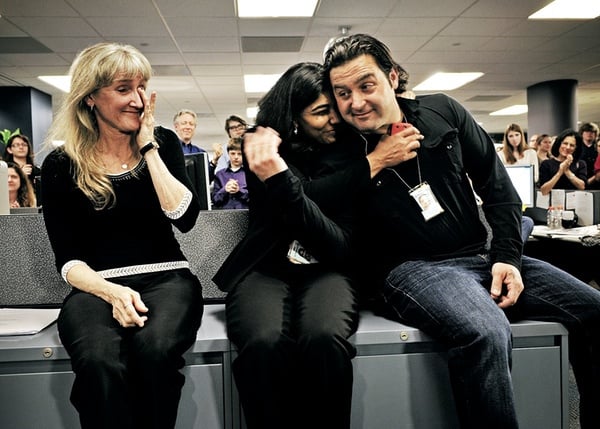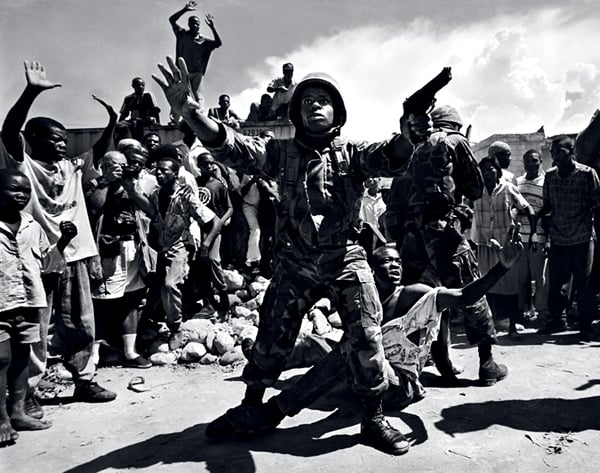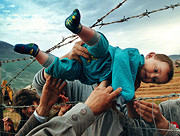US troops occupied Haiti to restore order after a military coup. Guzy was covering a pro-democracy march when a grade went off. "The mob was about to tear apart the man they thought had thrown the grenade," she says. "The soldier had pulled him out and definitely saved his life. I had fallen to the ground and got this shot looking up at the action."
Editor's note: This slideshow contains some graphic images.
She had just returned from family leave to her job as a photographer for the Post. Her mother was suffering from Alzheimer’s, and Guzy had been by her side in Bethlehem, Pennsylvania. “I promised her I would help her through the journey,” Guzy says. “If it had been anywhere but Haiti, I could not have considered going. But I had to.”
She packed in 20 minutes, hitched a ride to New York with AP photographer Gerald Herbert and Post reporter Mary Beth Sheridan, caught a flight to the Dominican Republic, and made her way to Port-au-Prince. “It was a surreal scene,” she says. “To see places I had been so many times, with people dead under schools, palaces, churches, apartments.”
For the next week, Guzy recorded scenes of death and destruction, hope and resilience, in the island country she had visited so many times that she called it “my obsession.”
How does she cope with the images of sorrow and horror in a place she loves?
“You cry,” she says. “Anyone who doesn’t cry I worry about.”
The Pulitzer board awarded the 2011 prize for breaking-news photography to Guzy and fellow Post photographers Nikki Kahn and Ricky Carioti for their work in Haiti. It was Guzy’s fourth Pulitzer. No other journalist has won that many. She joins two other four-time winners: poet Robert Frost and playwright Eugene O’Neill.
“It’s not me,” she says. “It’s Haiti. I have been to a lot of places. Haiti is the most intense—both positive and negative. The Haitian spirit touches your soul. After the quake, the Haitians mourned, they prayed, they cried, they picked themselves up and moved along. It’s unnerving.”
Guzy is sunk into a couch in her comfortable brick home in Arlington. She’s five-four with long blond hair and hazel eyes. Trixie, the dog she rescued from Hurricane Katrina, is draped across her chest. “She was born after the hurricane,” Guzy says. “The toxic sludge must have affected her. Her paws were twisted in. She walked like Charlie Chaplin. She suffers from progressive neurological issues.”

So Guzy hand-feeds and holds her. She’d like to create an animal sanctuary “for the unwanted ones.” Such as another mutt she found in Idaho while photographing a feature on hoarding. The dog’s coat was matted; vets gave her no chance. “Something about her got to me. She was an old soul that deserves comfort.” Guzy took her home, spruced her up, named her Hope. She lasted only a year.
Fixing broken souls might be what gives Guzy the strength to capture the scenes she does through the lens: men knifed to death; legs sticking out from rubble; mothers wailing over lost babies. Memuna Mansaray McShane, an amputee from Sierra Leone who became Guzy’s godchild. Photos of the Kosovo conflict, where she chronicled ethnic cleansing, won a Pulitzer. “The camera in front of your face is a shield, but it doesn’t mean you are not feeling what you see,” Guzy says. “There is the myth of objectivity—but it is a myth.”
Guzy grew up in working-class Bethlehem. Her father died when she was six. She lived with her mother and sister, 14 years her senior. Her mother worked in a sewing factory. “Not a lot of money,” Guzy says. “No car.”
She attended public schools, loved to draw and paint. She dreamed of becoming an artist but needed a job. After graduating from high school in 1974, she enrolled in a nursing program at Northampton Community College. “It was too hands on,” she says. “I was scared I was going to kill someone.” She got a nursing degree but never nursed.
Her boyfriend gave her a 35-millimeter camera, so she enrolled in a black-and-white photography course. In the darkroom, she watched a photographic image appear for the first time. “It was magical,” she says. “I failed the class, but I found my place, my passion.”
Guzy enrolled in the Art Institute of Fort Lauderdale, where she completed a two-year photography course. One of her professors was Walter Michot, a veteran photographer at the Miami Herald. He helped introduce her to photojournalism. “Boom—this was what I wanted to do,” she says. “It was so clear to me.”
It was probably clear to the photo editors at the Miami Herald that she had talent. She describes herself as “the crazy intern who wouldn’t leave.” The Herald hired her.
Guzy won her first Pulitzer in 1986 for spot-news photography of the aftermath of mudslides in Colombia that killed 23,000. She shared it with Michel du Cille, now her photo editor at the Post and the husband of Nikki Kahn, with whom she won her fourth Pulitzer. “What are the chances of that?” Guzy asks.
The Herald sent her to shoot the famine in Ethiopia and to other hot spots around the world, but she became fascinated with the predicament of a community closer to home: Miami’s Little Haiti. “It was the beginning of my obsession,” she says. “I didn’t even know it at the time. Something about the Haitians touched me.”
In 1988, Guzy married Jonathan Utz, a photographer with United Press International and Agence France-Presse; she moved with him to Washington and landed a job with the Post, joining a storied photo staff that eventually included Lucian Perkins, Nancy Andrews, and Michael Williamson. The paper sent her to cover the breakup of the Soviet Union, the civil war in Somalia, the aftermath of Hurricane Andrew in Florida. Guzy’s marriage suffered—and ended in the early ’90s—but her work for the Post continued.
Next: Guzy's award-winning work takes it toll

Carol Guzy, Nikki Kahn, and Ricky Carioti celebrate the news of their shared Pulitzer Prize for photographic coverage of Haiti in the aftermath of the 2010 earthquake. Kahn, 43, and Carioti, 42, joined the Washington Post in 2005. Guzy, Kahn says, “works herself to total exhaustion.” Photograph by Bill O’Leary/Washington Post via Getty Images
When the United States sent troops to Haiti in 1994 to intervene after a military coup, Guzy covered the mission and won her second Pulitzer, for spot news, in 1995.
In 1999, the Post dispatched her to Kosovo, where she sent back images from the conflict in the Balkans. She won, with Perkins and Williamson, the 2000 Pulitzer for feature photography—but at a cost: “I had been bouncing from one trouble spot to another for so long. When I returned to the United States after Kosovo, I crashed. I had been witnessing all that nasty stuff but not processing it. All the images came back—the chopped-up bodies, kids in gutters, weeping women. It was ethnic cleansing again. So horrible—what humans have the capacity to do to one another.”
Guzy didn’t feel it until she returned home to Arlington. It didn’t help that she had just broken up with a boyfriend. But it was the feelings provoked by what she had seen that brought her to her knees. “I felt guilty,” she says. “I had a house, food, friends—and I had just left people who were fighting for their home.”
Guzy took a leave from the Post for three months. She went into therapy. With time and talking and introspection, “the light came back on.” She calls it her “sacred pause.” It enabled her to feel rage and sadness yet continue to capture these and other emotions on camera.
Guzy started to go deeper into the lives of her subjects. She created photo narratives of children from Sierra Leone who had suffered amputations in their homeland and had come to the United States for prosthetic limbs. She followed John Thomas, a student at DC’s Ballou Senior High School, as he struggled to navigate the violence of his neighborhood, graduate, and make it to college. But it was Miss Classie who touched her to the core. “She felt like my Gram,” Guzy says.
Guzy met Clarice “Classie” Morant in 2008 on a magazine assignment about home health care. Miss Classie, 104 years old, was taking care of her sister, Rozzie Laney, 92. It wasn’t easy to win over Miss Classie, but Guzy finally got through: “You’re one of the bunch now, honey,” Miss Classie told her.
When her sister died, Miss Classie began to fade. Her relatives requested that Guzy stop taking photographs. She complied, but by then she was tied to Miss Classie and stayed by her side.
“But when I was asked to stop taking pictures and no longer had my lens as a shield,” Guzy wrote in a January 2010 Washington Post Magazine article, “I completely lost my objectivity. I became vulnerable to raw feelings—I, too, was losing someone I loved. I was left exposed, like film in the back of a camera that is opened too early.”
Guzy isn’t much of a techie. I ask her what kind of camera she uses. She knows it’s a Nikon. “I don’t pay much attention to the technical side,” she says. She was one of the last to go from film to digital: “It’s really your eye, your heart, your mind that matter in the moment you take a photograph.”
In that moment, how does she separate herself from the action and the subjects?
"When I was asked to stop taking pictures and no longer had my lens as a shield, I completely lost my objectivity. I became vulnerable to raw feelings."
“There were times in Haiti when we pulled people out of a mob,” she says. “There was the time we saw someone killed before our eyes.”
A group of Haitians had attacked a village, burned houses, and raped women. Guzy and other photographers were shooting the funeral of a community leader killed in the attacks when villagers thought they had spotted one of the killers. They grabbed him and started to knife him. Guzy and others tried to intervene but were driven back. She stepped away and took images of the man being knifed to death.
“We went from helping to shooting,” she says. “It’s such a weird line we ride.” Nikki Kahn arrived in Haiti on January 14, 2010, shortly after Guzy. Kahn had had some grim assignments during her five years at the Post, but Haiti topped them all.
“The smell of death permeates your clothes,” she says. “It lingers.” What did she get from working with Guzy? “She has an incredible work ethic,” Kahn says. “She works herself to total exhaustion. She wouldn’t sleep. She was awake at sunrise to get right to the rescue scenes. If I had gotten two hours of sleep, I felt guilty.”
The resulting images are affecting because they portray raw emotions. Guzy captures the essence of her subjects through their eyes. Some shock—such as a dead little girl, her head crushed on her school desk, a boy peering from the rubble feet away. But Guzy’s images can transcend journalism. One of her most arresting from Haiti is of a tall black cross overlooking a mass grave. It’s draped in black ribbons, with red flowers at the apex. A man in silhouette walks down a hill to the mass burial site. Another is of a small boy in a white smock, standing on a berm between white tents of a refugee camp spreading to the horizon.
The Corcoran Gallery of Art held a reception for Guzy, Kahn, and Carioti in May. Photographers came. Washington Post brass. And Carol Guzy’s “family.” There was Joe Minogue, the New York fireman she met covering the World Trade Center attack; Damba Koroma, one of the amputees from Sierra Leone; Miss Classie’s caregivers, Marilyn Daniel and Thelma Mobley; Peter Crowe, a volunteer Guzy met during the aftermath of Hurricane Katrina.
Guzy, dressed in black pants and gray heels, took to the microphone and talked about Haiti, its people, the saying she has on her refrigerator: “When you visit Haiti, it will break your heart; and when you leave, you won’t take back all the pieces.”
She told the crowd how elated she was when she told her mother she had won her most recent Pulitzer. In a lucid moment, her mother burst out: “Wow! Get out!”
This article appears in the August 2011 issue of The Washingtonian.




















